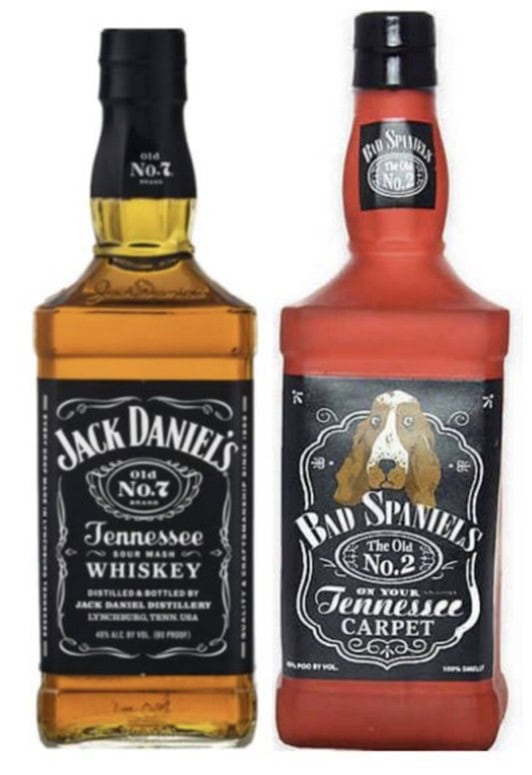VIP Products LLC v. Jack Daniel’s Properties
Background
VIP Products have been producing an array of parody dog toys in humorous shapes, including their Jack Daniel’s Whiskey shaped ‘Bad Spaniels’ dog toy, shown below.

In 2014, Jack Daniels sent VIP Products a Cease and Desist letter against the use of their trade marks on VIP’s dog toy. VIP Products filed a request for a declaratory Judgement from the District Court of Arizona on whether the use of “BAD SPANIELS” on their dog toy infringed Jack Daniel’s trade marks and trade dress. Jack Daniels counter claimed VIP for trade mark infringement and trade mark dilution. The case then proceeded to be seen in various courts over many years.
Originally, the District Court of Arizona found that the toy did infringe and dilute Jack Daniel’s trade mark and that there would be a likelihood of the toy confusing the consumers into believing that Jack Daniels endorsed the mark.
The case was then appealed to the Federal Circuit, where the Judge reversed the decision and found Bad Spaniels toy to be a work of expressive art and free speech.
Most recently, this case was last seen in the US Supreme Court in June 2023. Supreme Court
VIP Products’ defence against the alleged infringement was that they had a First Amendment right to free speech, with their product being an “expressive work” and therefore protected by the First Amendment. Additionally, VIP argued the alleged trade mark dilution argument was unconstitutional as the toy was a parody and therefore allowable as commentary on the Jack Daniels brand.
However, whilst considering this, the Supreme Court ruled that the previously applied Rogers v Grimaldi test – which protects expressive works, such as books, movies and art from being accused of trade mark infringement – did not apply to this case and that standard trade mark laws on infringement should therefore be applied instead.
The Court, at this stage, did not make a decision as to whether infringement had occurred, and instead instructed lower courts to apply the traditional trade mark infringement analysis.
The Supreme Court also noted that the use of the term ‘BAD SPANIELS’ and the highly similar trade dress used as décor on the dog toy would cause a likelihood of confusion regarding the source of the product, as it appeared as if Jack Daniel’s had endorsed or approved of the use of their trade dress.
The Supreme Court then remanded the case back to the District Court of Arizona, in order for the lower court to apply the correct tests to determine whether “BAD SPANIELS” infringes on or tarnishes Jack Daniel’s trade marks.
District Court of Arizona
The case was then returned to the District Court of Arizona, overseen by Judge McNamee, the original judge from 2014.
One of VIP’s defences was that their use of the trade dress was acceptable under the US’s fair use defence. However, this defence was rejected as fair use generally covers non-commercial use for critique and comment, rather than a for-profit manufacturer of dog toys.
Regarding trade mark infringement, Judge McNamee found that VIP had not intended to deceive customers, as the product was created with the intention to parody. In the previous Hearing, the Supreme Court Judge advised that a successful parody would not cause confusion to the consumers. Therefore, when applying this guidance, Judge McNamee found that as the parody of the Jack Daniel’s bottle was a successful one, there was no likelihood of confusion and the dog toy had not infringed Jack Daniel’s marks.
However, when considering dilution of Jack Daniel’s trade marks, the Court found that VIP Products had tarnished Jack Daniel’s trade mark with the use of toilet humour and dog waste related puns on the dog toy, and that as Jack Daniel’s products were for human consumption, these jokes would not mix well. The association of the crude jokes was found to likely be harmful to Jack Daniel’s brand.
Conclusion
Based on the findings that VIP had diluted Jack Daniel’s trade marks, VIP Products was ordered to stop producing the dog toy. However, there is the opportunity for a further appeal back to the ninth circuit.









